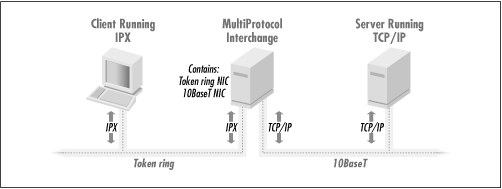MultiProtocol Interchange
Modern networks can be extremely complex, supporting multiple network protocols in a large, geographically dispersed network. In order to truly support network independence, SQL*Net must be able to communicate using more than one protocol. For example, a truly independent and open system would allow a workstation running IPX/SPX in a Novell environment to access an Oracle server running TCP/IP in a Unix environment. To provide this capability, Oracle developed the MultiProtocol Interchange (MPI).
The MultiProtocol Interchange performs protocol conversions to allow SQL*Net data originating on a network utilizing one protocol to flow to a network utilizing a different protocol. Figure 5.4 shows a node on a network running IPX with the MPI in the center connecting to a network and server running TCP.
 |
As can be seen from this figure, the MultiProtocol Interchange requires:
A host machine (which may be a PC)
The MPI software
Two or more network interface cards (NICs), one for each supported protocol
Appropriate software to implement the supported network protocols
Because the MPI utilizes multiple NICs, it is able to convert data not only from one protocol to another, but also from one physical network implementation to another. For example, a MultiProtocol Interchange may convert SQL*Net data from token ring to 10BaseT.
The ...
Get Oracle Database Administration: The Essential Refe now with the O’Reilly learning platform.
O’Reilly members experience books, live events, courses curated by job role, and more from O’Reilly and nearly 200 top publishers.

